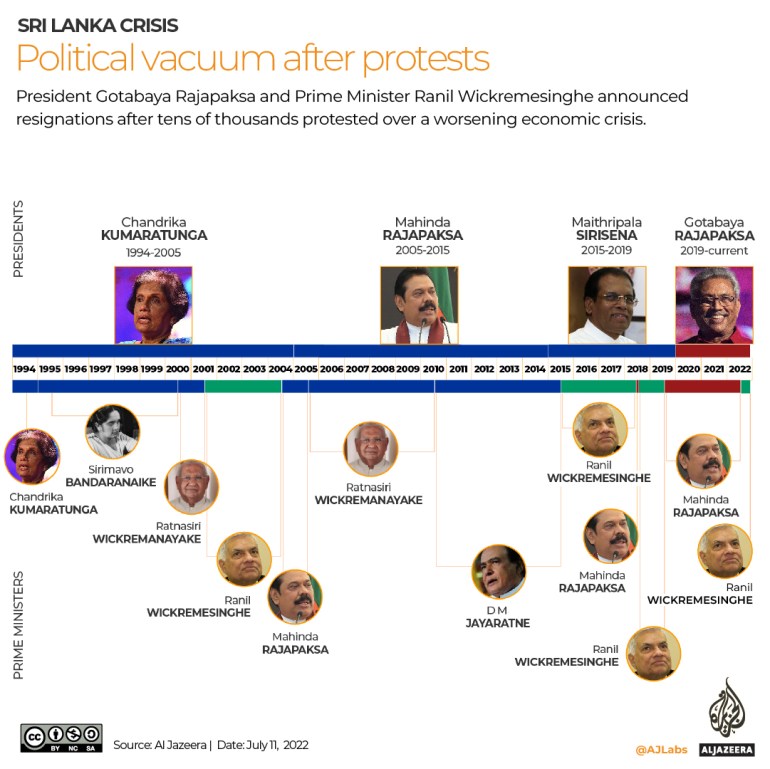Sri Lanka parliament to hold vote on July 20 for new president
Sri Lanka‘s parliament will hold a vote on July 20 to elect a new president, its speaker has said, to replace President Gotabaya Rajapaksa, who has promised to resign by Wednesday.
The statement on Monday comes after protesters stormed the residences of the current president and prime minister, prompting both officials to go into hiding amid an economic meltdown.
The process of electing a new president involves calling for nominations among members of the 225-seat parliament, which should be submitted on July 19.
A vote would be held the following day, in keeping with a decision taken at a meeting of political leaders led by parliamentary speaker Mahinda Yapa Abeywardena.
“During the party leaders’ meeting held today it was agreed that this was essential to ensure a new all-party government is in place in accordance with the constitution,” Abeywardena said in a statement.
“The ruling party has said the prime minister and the cabinet are ready to resign to appoint an all-party government.”
President Rajapaksa had overseen a ruthless crushing of the Tamil Tigers fighters as defence secretary. His brothers and nephew earlier quit as ministers as Sri Lanka began running out of fuel, food and other essentials in the worst crisis since independence from Britain in 1948.
Prime Minister Ranil Wickremesinghe, whose private home was set alight by protesters, has said he will step down.
His office said Rajapaksa had confirmed his resignation plans to the prime minister, adding that the cabinet would resign once a deal was reached to form an all-party government.
Protesters threatened to call an island-wide strike by Thursday if both leaders have not resigned by that point.
Leaders of the protest movement have said crowds will occupy the residences of the president and prime minister in Colombo until they finally quit office.
Over the weekend at the president’s house, protesters jumped into the swimming pool, lounged on a four-poster bed, jostled for turns on a treadmill and tried out the sofas.
Colombo was calm on Monday as hundreds of people strolled into the president’s secretariat and residence and toured the colonial-era buildings. Police made no attempt to intervene.

Threats to IMF rescue package
The political instability could damage negotiations with the International Monetary Fund (IMF) for a rescue package, the central bank governor told the Reuters news agency.
Governor P Nandalal Weerasinghe signalled he would stay on in the job although he had said in May he could resign if there was no political stability in the island nation of 22 million people.
Rajapaksa and Wickremesinghe were not in their residences when the protesters surged into the buildings and have not been seen in public since Friday.
Rajapaksa’s whereabouts were not clear but Wickremesinghe’s media team said in a statement he held a meeting with cabinet ministers at the prime minister’s office on Monday.
Wickremesinghe’s private home in an affluent Colombo suburb was set on fire on Saturday, and three suspects have been arrested.
Sri Lankans have mainly blamed Rajapaksa for the collapse of the tourism-dependent economy, which was hammered badly by the COVID-19 pandemic and a ban on chemical fertilisers that damaged farm output. The ban was later reversed.
Government finances were crippled by mounting debt and lavish tax breaks given by the Rajapaksa government. Foreign exchange reserves were quickly depleted as oil prices rose.
The country barely has any dollars left to import fuel, which has been severely rationed, and long lines have formed in front of shops selling cooking gas. Headline inflation hit 54.6 percent last month, and the central bank has warned that it could rise to 70 percent in the coming months.



